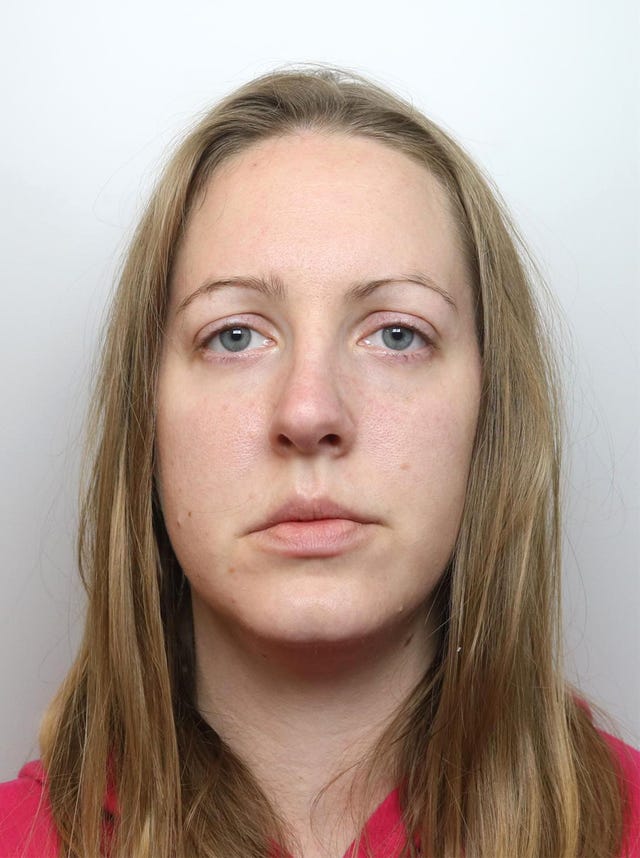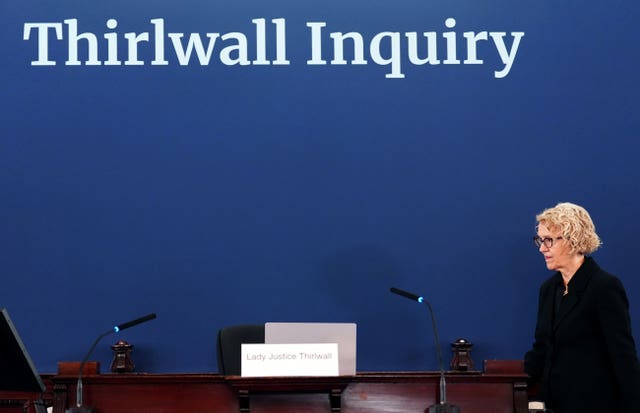Child serial killer Lucy Letby made a number of visits to Alder Hey Children’s Hospital after she was removed from nursing duties at the Countess of Chester, a public inquiry has heard.
Letby, 34, was also said to have visited the Countess of Chester’s neonatal unit in the same period, including a “tea party” to welcome her expected return to the ward.
She was switched to clerical work in July 2016 after senior consultant paediatricians raised concerns to their bosses about “patient safety” in the neonatal unit.
The inquiry into the events surrounding the crimes of Letby heard she launched a grievance procedure in September 2017 over the removal which was resolved in her favour several months later.
Counsel to the inquiry Rachel Langdale KC said a planned return to the neonatal unit was then only stopped by the “tenacious lobbying of the consultants”.

However, the hearing at Liverpool Town Hall was told that in late January 2017 Letby had been involved with discussions to attend Liverpool’s Alder Hey “to view theatre lists and have an observational contract”.
Ms Langdale said the inquiry would hear evidence that Letby went on to make a number of supervised visits including outpatient, clinics, ward rounds and team meetings – although a witness would say they believed she had no known unsupervised patient contact.
Letby was not informed until June 2017 by the Countess that she could no longer attend Alder Hey – just weeks after the Countess first formally contacted Cheshire Police about a series of sudden and unexpected deaths on the unit in 2015 and 2016.
Ms Langdale said: “Letby attending Alder Hey Children’s hospital in any capacity during the period she was excluded from the neonatal unit is an area of particular concern for the inquiry.
“The extent to which Alder Hey were informed of the concerns which had been expressed about Letby and the fact she had been moved to a non-clinical role six months earlier are matters which need to be clearly understood.”
She said Letby was told in April 2017 that her scheduled return to the unit was to be paused and it was recommended she stop any further visits.

“Whether and how often this occurred and, if it did, who sanctioned it, are matters the inquiry will be investigating.”
The inquiry heard in February 2017 she, along with another nurse referred to as Nurse Z, attended a “tea party” which Yvonne Griffiths, deputy unit manager, explained to staff was to welcome her back.
In a statement to the inquiry, nursery nurse Jean Peers said: “I was on (at) the weekend and so was Yvonne Griffiths, she said that Letby was coming with Nurse Z and that we would do a tea party to welcome her.
“We did cakes and tea, and she came in and we were all talking, and she did not say a word to us.
“Yvonne and I were talking a lot to make it nice and relaxed and when she went, we both said: ‘Oh my God, she is going to make it hard for us when she returns as she seems angry.’”
Ms Langdale said the conclusion of the grievance procedure led to the Countess’s executive directors group “apparently proceeding on the basis that Letby had been ‘exonerated’.”
She went on: “In particular, the inquiry will be seeking to understand how it could be said that the grievance procedure, which was an investigation of a complaint by Letby as to how she had been treated, could reasonably be interpreted as exonerating her.”
A board meeting followed which noted that “an apology would be requested from the consultants” and that chief executive Tony Chambers was recorded as saying: “Let’s be clear that we need to draw a line on the past.”
The inquiry heard in March 2017 a decision was made to contact police at a meeting attended by executive directors, but police were not contacted formally until May.
Ms Langdale said the inquiry would be examining a document, provided to police in May 2017, which set out concerns from seven consultants.
She said: “Could Letby have been stopped sooner than she was? Were opportunities for detection missed? Should concerns have resulted in action sooner?
“These questions go to the very heart of whether lives could have been saved and injury prevented.”
The inquiry also heard the case of fellow of serial killer nurse Beverley Allitt formed part of Letby’s training.
Ms Langdale said the inquiry would hear from a senior lecturer in the child nursing programme at the University of Chester, where Letby qualified in 2011, who said the case of Allitt formed part of student training and learning.
Letby, from Hereford, is serving 15 whole-life orders after she was convicted at Manchester Crown Court of murdering seven infants and attempting to murder seven others, with two attempts on one of her victims, between June 2015 and June 2016.
Chairwoman Lady Justice Thirlwall said the inquiry would not examine the convictions, saying an “outpouring of comment” on their validity had “caused enormous additional distress to the parents”.
The first week of the Thirlwall Inquiry will hear opening statements from the counsel to the inquiry, along with legal representatives from core participants including the families of Letby’s victims.
Lady Justice Thirlwall said it was planned that the hearings in Liverpool would finish in early 2025 and she expected her findings to be published by late autumn of that year.
A court order prohibits reporting of the identities of the surviving and dead children involved in the case.






